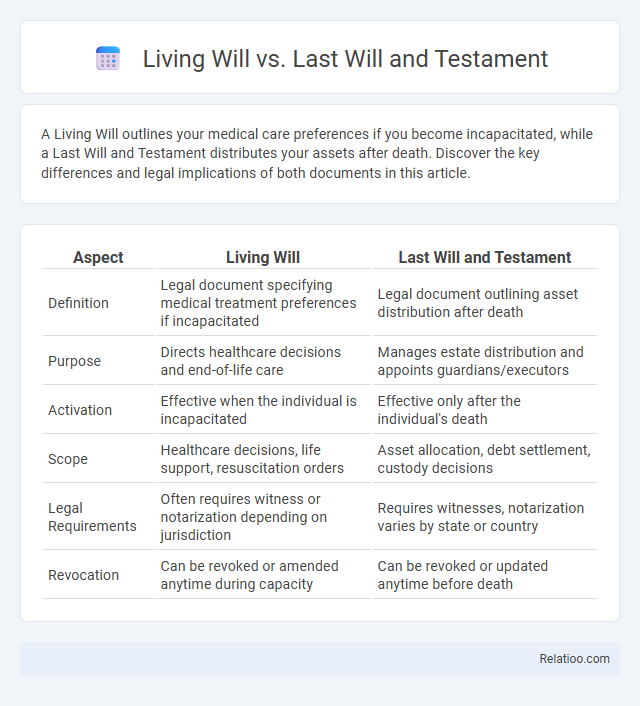A Living Will outlines your medical care preferences if you become incapacitated, while a Last Will and Testament distributes your assets after death. Discover the key differences and legal implications of both documents in this article.
Table of Comparison
| Aspect | Living Will | Last Will and Testament |
|---|---|---|
| Definition | Legal document specifying medical treatment preferences if incapacitated | Legal document outlining asset distribution after death |
| Purpose | Directs healthcare decisions and end-of-life care | Manages estate distribution and appoints guardians/executors |
| Activation | Effective when the individual is incapacitated | Effective only after the individual's death |
| Scope | Healthcare decisions, life support, resuscitation orders | Asset allocation, debt settlement, custody decisions |
| Legal Requirements | Often requires witness or notarization depending on jurisdiction | Requires witnesses, notarization varies by state or country |
| Revocation | Can be revoked or amended anytime during capacity | Can be revoked or updated anytime before death |
Understanding Living Wills and Last Wills: Key Differences
Understanding Living Wills and Last Wills involves recognizing their distinct purposes: a Living Will outlines your healthcare preferences in case you become incapacitated, while a Last Will and Testament directs the distribution of your assets after death. You should ensure your Living Will clearly specifies medical decisions to avoid unwanted treatments, whereas your Last Will appoints executors and beneficiaries to manage and inherit your estate. Properly differentiating these documents safeguards both your healthcare wishes and your financial legacy.
What Is a Living Will?
A Living Will is a legal document that outlines your healthcare preferences if you become incapacitated and unable to communicate your wishes. Unlike a Last Will and Testament, which distributes your assets after death, a Living Will specifically addresses medical treatments and end-of-life care. Your Living Will ensures that medical professionals and family members understand your desires regarding life-sustaining measures.
What Is a Last Will and Testament?
A Last Will and Testament is a legal document that specifies how your assets and property will be distributed after your death and appoints guardians for minor children if applicable. Unlike a Living Will, which outlines your medical treatment preferences while you are alive but incapacitated, a Last Will takes effect only after you pass away. Understanding the distinction ensures your wishes are honored both during your life and after.
Purpose and Importance of a Living Will
A Living Will is a legal document that outlines your healthcare preferences if you become incapacitated, ensuring your medical treatment aligns with your wishes. Unlike a Last Will and Testament, which distributes your assets after death, a Living Will focuses solely on end-of-life care decisions. Your Living Will is crucial for guiding healthcare providers and family members during critical medical situations, preventing confusion and unnecessary interventions.
Purpose and Importance of a Last Will and Testament
A Last Will and Testament serves as a legally binding document that outlines how Your assets and estate will be distributed after Your death, ensuring Your wishes are honored and minimizing disputes among heirs. Unlike a Living Will, which specifies Your healthcare preferences in case of incapacitation, or a Durable Power of Attorney that designates someone to make financial decisions, the Last Will primarily addresses inheritance and guardianship. Its importance lies in providing clear directives, protecting beneficiaries, and enabling a smoother probate process.
Legal Requirements for Living Wills vs Last Wills
Living wills require clear documentation of your healthcare preferences in case you become incapacitated, often needing witnesses and notarization depending on state laws, whereas last wills and testaments govern the distribution of your property and must be signed, witnessed, and sometimes notarized to be legally valid. Your living will emphasizes medical decisions and does not distribute assets, while a last will directs how your estate is managed after death. Understanding the legal requirements ensures both documents are properly executed and enforceable according to your state's regulations.
When Do Living Wills and Last Wills Take Effect?
Living wills take effect immediately once a person becomes incapacitated and unable to communicate their healthcare preferences, ensuring their medical treatment wishes are honored. Last wills and testaments come into effect only after the individual's death, detailing the distribution of assets and guardianship arrangements. Unlike living wills, last wills do not influence medical decisions but govern estate management posthumously.
Choosing Between a Living Will and a Last Will
Choosing between a Living Will and a Last Will and Testament depends on your specific needs: a Living Will outlines your medical treatment preferences if you become incapacitated, while a Last Will and Testament distributes your assets and names guardians after death. Your Living Will ensures healthcare decisions are respected during critical illness, whereas your Last Will organizes the legal handling of your estate. Understanding these distinctions helps you determine which document aligns with your priorities for end-of-life and legacy planning.
Common Misconceptions About Living and Last Wills
Many people confuse a Living Will with a Last Will and Testament, but these documents serve distinctly different purposes; a Living Will outlines your healthcare preferences if you become incapacitated, while a Last Will and Testament directs the distribution of your assets after death. A common misconception is that a Living Will handles financial matters, but it exclusively addresses medical decisions and end-of-life care. Understanding these differences ensures that your wishes are properly documented and legally respected.
How to Create a Comprehensive Estate Plan
Creating a comprehensive estate plan involves understanding the distinct roles of a Living Will, Last Will and Testament, and Durable Power of Attorney. Your Living Will outlines medical treatment preferences during incapacitation, while the Last Will and Testament details asset distribution after death. Combining these documents ensures your healthcare wishes and financial matters are managed effectively, providing clarity and control over your estate.

Infographic: Living Will vs Last Will and Testament
 relatioo.com
relatioo.com